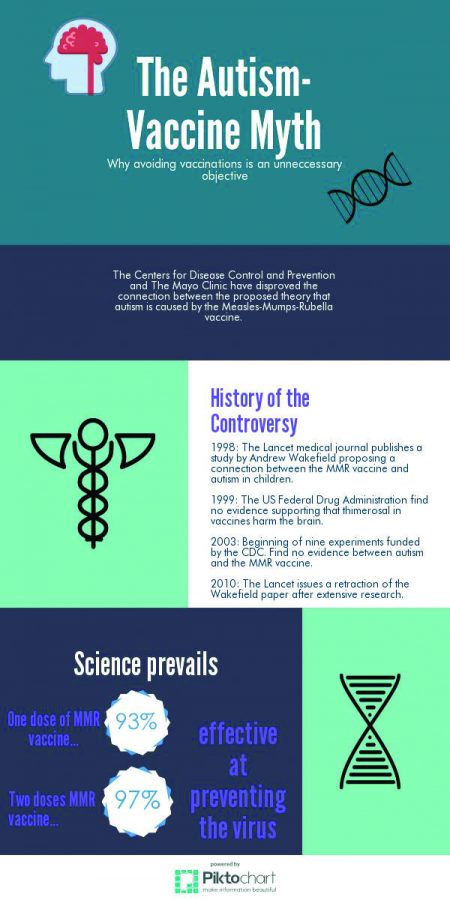Vaccines don’t cause autism
October 24, 2016
Refusing to get vaccinations due to the fear of them being linked to autism is an irresponsible endeavor as there is currently no valid research proving it.
In 1998, The Lancet, a British medical journal, published a study linking the measles-mumps-rubella vaccination (MMR) to cases of autism. The public’s reaction was explosive and fear spread rapidly, causing vaccine rates to drop. The public assumed that this study was accurate and trustworthy, but it was the opposite.
The public was unaware at the time that the study “involved just 12 children” and “falsified data,” according to NOVA. The mistake of some, however, was continuing to believe in this vaccine myth even after it had been disproved. Believing in a study that has already been disproved is unnecessary and a waste of time.
Three years after The Lancet study was published, the Journal of the American Medical Association (JAMA) found no connection between MMR and autism in children. JAMA is a respected and revered association that is dedicated to “promoting the science and art of medicine and the betterment of the public health, ” as they clearly affirm in their mission statement. It is unreasonable to continue to believe in the connection between MMR and autism since a more thorough experiment was conducted with the purpose of disproving it.
JAMA was not the only organization to take action against this extraneous idea. The Mayo Clinic and the Centers for Disease Control and Prevention (CDC), both of which are renowned medical sources, have clearly reported that there are no links between autism and vaccinations.
The CDC has conducted nine experiments proving that there is no correlation between autism and the MMR vaccine or Thimerosal containing vaccines, as some incorrectly believed. Thimerosal is an additive in some vaccines meant to prevent the growth of bacteria in vaccines. This prevention of bacteria in vaccines is incredibly important because bacterial growth can lead to more severe illnesses or death.
It is incredibly ridiculous to put other children at risk for disease just because parents may not share the same beliefs about this vaccine controversy. Stubbornness will benefit no one, especially when the lives of children are at stake. Those who argue that the MMR vaccine does in fact cause autism are completely disregarding the many experiments that have proven otherwise. Dr Stephanie Seneff published an untrustworthy paper in Journal Entropy, stating connections between MMR and autism. She claimed that vaccines also contributed to higher rates of depression, seizures, and pain.
If her experiment was reliable, it would have gained traction in the medical world. It would have been more widely acknowledged. The lack of response from well known medical associations, like the Mayo Clinic and the CDC reflects its lack of legitimacy.
Another legitimate source disproving this connection was the New England Journal of Medicine. In 2007 they published a study declaring no proof of the connection between autism and vaccinations. Their study used 1047 children, in comparison to The Lancet study that only used 12 children.
The study that tested a much larger group of children would obviously conclude in more accurate results. Those who continue to focus only on their own opinion and not other sources are not understanding the importance of vaccines.
The Lancet paper caused fear to take control of some parents, therefore causing them to forgo important vaccinations that their children require to be healthy and stable. Anxiety about the possibility of autism in children led to the emotions of the public to be tested. The reason this controversy still persists is because some refuse to believe scientific data, choosing their heart over their head.
This refusal to trust the many experiments performed by trustworthy programs can possibly lead to more illnesses that could be easily avoided if children are given the correct vaccinations.
Autism is a complicated disorder that is currently believed to begin during fetal development or be connected to specific mutations that may or may not be inherited. The science community has worked diligently since The Lancet study to prove them wrong. Their work paid off, as the study was formally retracted in 2010.
A disproven study is not something that should be continued to be believed. Trust in what has been proven multiple times.
As mentioned there is a significant amount of research from credible sources to sway those who are unsure about vaccinations. They should not let their fear of the uncontrollable scare them away from vaccinations that do not cause autism or illnesses. Do not forgo getting vaccinations because they are essential to the health of the public and do in fact save lives.












